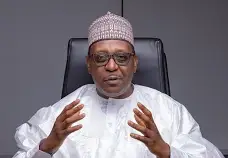In Abuja, anti-hunger protest took a bizarre dimension when a man, Shuaibu Alhaji Yushau decided to sacrifice himself for the plight of thousands of people struggling to get food as hunger, occasioned by food shortage bites harder. Gom Mirian recounts how the man climbed a tall pole only to call for attention about the hunger and food crisis situations in the country.
Nigeria has faced an alarming increase in the number of citizens who have resorted to extreme measures, such as suicidal protests, to draw attention to the dire economic conditions plaguing the nation. Shuaibu Alhaji Yushau is one, who expressed his frustration with hunger and climbed a 120ft mast. He left a poignant suicide note to demand urgent government intervention to address the challenges facing the country.
Shuaibu’s act has shed light on the frustration faced by ordinary Nigerians, who are grappling with hunger and unjustifiable economic hardship on a daily basis. Like Yushau, countless numbers have gone to their early graves, no thanks to the current hardship. Many are walking corpses with potential mental health challenge and just counting days for the inevitable action-suicide attempts.
The Frustration of Ordinary Nigerians
Shuaibu’s desperation mirrors the anguish felt by countless ordinary Nigerians who are plunged into poverty and hunger due to unfavourable economic conditions. To capture the depth of this frustration, Africa Health Report, (AHR), interviewed individuals across different regions of Nigeria. Mrs. Abigail, a mother of three in Abuja, laments, “Every day, I struggle to put food on the table for my children. The prices of food items keep skyrocketing, and our incomes remain stagnant.”
A phone conversation with Mr. Michael Bitto in Makurdi echoes Shuaibu’s desperation, warning of a potential crisis akin to the End SARS movement. Stating, “That’s the feelings of most Nigerians. It will soon get to the point where Nigerians will have what will be worse than end SARS.”

In Lagos, Mr. Ridwan Ishaq, a federal civil servant, emphasizes the dire situation faced by many Nigerians.
His words; “The ordinary poor Nigerian has been pushed to the wall. And when there is no means of survival, a helpless man can resort to doing the unthinkable, including taking his own life.
“So, my advice to the government is that, instead of arresting the suicidal man, he should be made to undergo rehabilitation and be empowered. Nigerians are suffering.”
While some, like Mary in Port Harcourt, question Shuaibu’s drastic actions, highlighting the shared suffering of the population, it is evident that his act symbolizes a larger cry for help from a nation grappling with economic turmoil.
She told AHR in a phone interview that, “We are all suffering together but taking a life given to you freely by God doesn’t sound good to man at all.”
Mental Health Implications
The alarming spike in suicidal protests underscores the mental health toll that Nigerians are enduring. Dr. Olufemi Oluwatayo, CEO of Retreat Healthcare, Lagos, delves into the psychological impact of suicide attempts, emphasising the complex reasons behind such actions.
In an interview with AHR, Dr. Oluwatayo, highlights the negative repercussions on individuals, witnesses, and society at large, stressing the need for comprehensive mental health support rather than criminalization.
“A very public suicide attempt like the one undertaken by Mr. Shuaibu Alhaji Yushau sends a negative message to the public and impacts adversely on our collective psyche as a people. It implies that things are really bad in the country economically and in various other aspects. It arouses negative feelings in us and should lead us to ask questions. Do we as a group of people care about each other? Do we care about the vulnerable in society? ” He asked.

Speaking further on the arrest of Shuaibu by the police authorities, Dr. Oluwatayo praised the police for following the proper process in arresting Shuaibu after ensuring he did not have a mental disorder, stating that they should be commended for their actions. Stating, “The Nigeria Penal Code Chapter 27, Section 327 states “Any person who attempts to kill himself is guilty of a misdemeanour and is liable to imprisonment for one year”
He also pointed out that while the police have the right to charge Shuaibu for disturbing public peace or attempted suicide, it is important to consider the underlying reasons for such behaviour, such as mental health issues or difficult life circumstances.
He expressed hope that the current Attorney General’s plans to remove the law criminalizing attempted suicide from the statute books will come to fruition, highlighting the importance of addressing mental health issues in a compassionate and understanding manner.
His call for a shift towards mental wellness promotion and destigmatisation resonates as a crucial step in addressing the underlying issues driving extreme measures in response to hardship.
The Legal Perspective
The arrest of Shuaibu raises legal questions regarding the criminality of suicide attempts in Nigeria. Barrister Deji Ajare, a Legal Practitioner and Executive Director at Sterling Law Centre, highlights the existing legal framework that criminalizes attempted suicide, underscoring the need for a more compassionate response from authorities.
He said, “In Nigeria, suicide is not explicitly decriminalized under the law. Section 327 of the Criminal Code Act and Section 231 of the Penal Code criminalize attempted suicide. This means that Shuaibu Alhaji Yushau’s attempt to take his own life by climbing the mast could be, strictly speaking, considered a criminal offense under the law.
“I find it quite shocking though, that despite the rationale behind the threatened suicide, the best response the authorities can offer is a threat of prosecution. Everyone, including the leadership of the country, concedes that there is hardship in the country, and Shuaibu, like many other Nigerians, are protesting the apparent failure of the government to cushion the hardship, which it created in the first place.
“A sensitive and people-centric government would rather be alarmed at the turn of events that would lead its citizens to suicide. Recall that there have been some hardship-induced suicides across the country lately.”
Mr. Ajare while calling on the government to rather intensify efforts in cushioning the hardship that plagues the country said, “These recent events in Nigeria further highlight the folly of the criminalization of attempted suicide. Efforts should be directed towards promoting mental wellness, reducing stigmas associated with mental health challenges, and ensuring that those in distress receive the help and support they need, rather than compounding the circumstances of such people by making them go through a trial.”
Policies That Brought Undue Hardships
Nigeria’s present administration has implemented certain policies that have exacerbated the hardships faced by its citizens. The removal of fuel subsidies on 29th May 2023 resulted in an astronomical increase in transportation costs, which further pushed many Nigerians into poverty. Additionally, strict border closures aimed at promoting local agricultural production have inadvertently led to shortages and increased food prices, making it even more challenging for Nigerians to access necessities.
The Plight of Poverty-Stricken Nigerians
Statistics reveal the staggering extent of poverty plaguing Nigerians. According to the World Bank report, over 40.7% of Nigerians live below the poverty line in 2024. This translates to approximately 83 million Nigerians living in extreme poverty, struggling to afford basic healthcare, education, and adequate nutrition.
Government Efforts to Alleviate Hunger and Hardship
Despite the challenges faced by Nigerians, the government has made attempts to address the issue of hunger and alleviate economic hardship. Initiatives such as the National Social Investment Program, which includes the Conditional Cash Transfer and the National Homegrown School Feeding Program, aim to provide support for vulnerable populations and ensure schoolchildren have access to nutritious meals.
Also, there have been efforts to promote agriculture and empower farmers through initiatives such as the Anchor Borrowers Program.
But only recently, on July 9, President Bola Tinubu through the Minister of Agriculture and Food Security, Alhaji Abubakar Kyari announced a 150-day suspension of payment of duties, tariffs and taxes on some food items such as maize, husk brown rice and wheat that are imported to the country through land and sea borders to cushion the impact of the high food prices Nigerians have been grappling with since the present administration came on board a year ago.
“The federal government hopes to quell the food security problem in the next 180 days through the granting of 150days import window for certain food commodities, while the federal government will import 250,000 metric tonnes of wheat and maize to fill the depleted strategic grain reserve,” Kyari stated.
While these initiatives represent steps towards alleviating hardship, they still look like a throw of spit in the ocean by many Nigerians like Shuaibu and Lliyasu who are left with no option but to resort to desperate act like attempting suicide as hunger bites harder and undue hardship stare them daily in the face with no better solution to offer.
Shuaibu’s desperate act serves as a stark reminder of the profound suffering endured by ordinary Nigerians in the face of hunger and hardship.
The report calls for a re-evaluation of policies, a focus on mental health support, and a compassionate response from authorities to address the systemic issues driving extreme actions.
Only through concerted efforts to uplift its citizens and residents alike, and tackle poverty can Nigeria move towards a brighter and more prosperous future for all.


